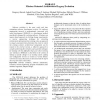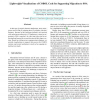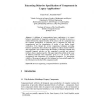42 search results - page 3 / 9 » Reverse Engineering of Legacy Code Exposed |
WCRE
2007
IEEE
13 years 11 months ago
2007
IEEE
Legacy applications can be difficult and time-consuming to understand and update due to the lack of modern abstraction mechanisms in legacy languages, as well as the gradual dete...
ICSM
1997
IEEE
13 years 9 months ago
1997
IEEE
Software evolution is the most costly and time consuming software development activity. Yet software engineering research is predominantly concerned with initial development. MORA...
ECEASST
2007
13 years 5 months ago
2007
In this age of complex business landscapes, many enterprises turn to SOA for aligning their IT portfolio with their business. Because of the enormous business risk involved with r...
CBSE
2009
Springer
13 years 10 months ago
2009
Springer
A challenge of componentizing legacy applications is to extract behavior specification of suggested components. It is desirable to preserve a relation between the original structur...
SCAM
2008
IEEE
13 years 11 months ago
2008
IEEE
—More and more current software systems rely on non trivial coordination logic for combining autonomous services typically running on different platforms and often owned by diffe...



